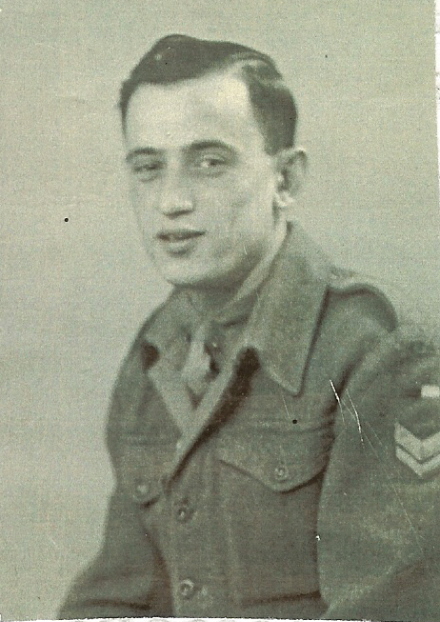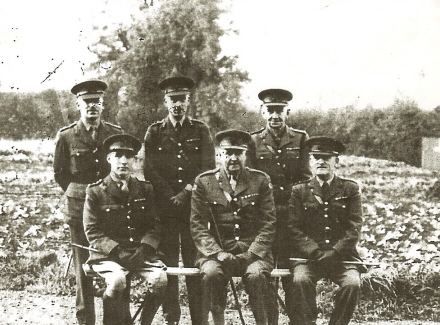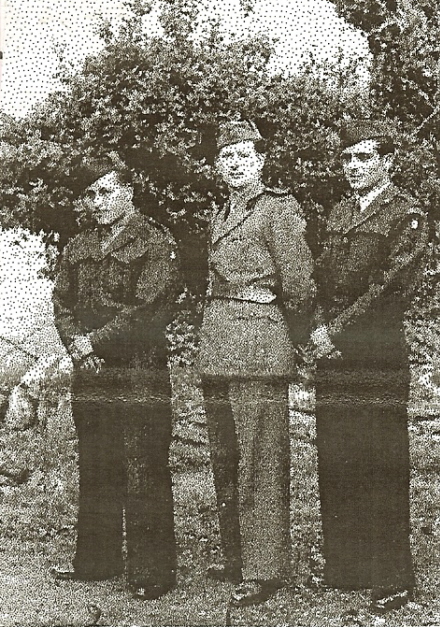|
Page 1 of 2  Finally, on the early afternoon of the same day, we were loaded onto a train and left the big station [Birmingham New Sreet]. The train was practically full and after a couple of hours we approached a big group of hills covered with a lot of snow. Finally, on the early afternoon of the same day, we were loaded onto a train and left the big station [Birmingham New Sreet]. The train was practically full and after a couple of hours we approached a big group of hills covered with a lot of snow.
Our guard said: "Mountains there Malvern Hills". It looked a perfect picture, the fog had lifted, the sun was still shining, but after we got out of the long tunnel, it started raining, and our guard again said: "This England! If you can live in England, you can live anywhere"! More hills, some villages, a castle that the guard said is called 'the Castle of Eastnor', (a nephew of the family Summers is an officer at our camp), where it will be our last destination. And again a long tunnel and finally a country station, and our guards together said with a big smile: "Journey finished, welcome to Ledbury"! He passed us to two guards, but before that, Reg and that other guard shook hands with each of us, and wishing us good luck, left us and went back on the train.
Our new guard, who was from the local PoW camp, was a little Scot and could converse with us quite well, so after telling us to put our ground sheets on, we steadily marched through the town, and, as it was Christmas time, we could not see many people around except a few girls, giving us the eye.... .... Our new PoW camp was right at the end of the town's main street. We stopped by a quaint little building on the right.... We met a group of smiling British soldiers. One was an officer who could speak perfect Italian. The soldiers carried bundles of gumboots that every one of us was begged to wear for the simple reason that the camp was now in the process of being built and from the main gate to all the huts (about 40 in all) it was very muddy. The huts were nearly all occupied with 30 men in each. The total number of PoWs in the camp was 700..... 
Major Gillingham and the Brits. Officers in charge 1941-1946. Most working days, from Monday to Friday, over 500 men used to go out to work on the land.... We newly arrived, all took on jobs which were needed to be taken for the running of the camp. The Sergeant Major was appointed camp leader. I was appointed by the War Agr. Mr. Stanley Smith his Italian labour officer, plus canteen manager. The other sergeants took on internal appointments, such as cookhouse, P.T. maintenance and other duties to run this camp so properly. The camp with our help was completely finished by early spring 1942. The builder was very pleased with the willing help given by our lads of our camp staff. Our Commandant, Major Thomas (a Welshman), that remained the Commandant of our camp from the first year, 1941 until 1945, when he was replaced by Major Gillingham (a Londoner). Major Thomas purchased flowers, plants and seeds and our two gardeners made a good job of it. Our camp became a show for the locals to visit...... 
From the left: The gardener, the Italian doctor and our cobbler. .... This was exactly the end of February 1942 and it was very cold, snow was expected. One night it fell quite heavily and it continued the following day. It was about midweek, the work lorries could not go, so the lads were having a break, but as soon as it happened the local council suggested using two or three squads of Italian PoWs to clear the snow from the main streets and pavements. The camp leader suggested to me to be in charge of the operation because I was quite capable of conversing with the civilians out in the streets. So, I asked for volunteers and I was very pleased, I did not have any problems in forming a willing working party to go out after lunch. Two sentries from our camp guards came out with us so in no time, men with shovels and brooms then started to clear the snow as I so instructed, from the top of the entrance of our camp, which was now marked on the gate: "27 PoW Camp" - right up the main street and pavements. On passing the old Catholic Church of the Most Holy Trinity, our priest, Father Goatman, came out to ask me and some men if we would oblige to clear the entrance to the church. This they did and before dark fell on us we were clearing the street, well past the New House, the Top Cross, the Feathers Hotel, St Katherine's Hospital, the Almshouses, around the War Memorial monument, the Market House and to the end of the day, a gang cleared up the most quaint narrow lane, paved with cobbles stones taking us up to the gates of the big church, including the entrance to the police station, still in existence in them days.... The following day most of the same men came out with me after having been promised a good meal for the night, dinner with compliments of the camp Commandant. The day was a very clear day but very cold. This day remained me of good memory. While the men were clearing the snow opposite the cinema, a young woman called me over near her house, and rubbing her hands to warm them up, she said: "My husband is in the war. You cold? You like a cup of tea?" I said: "Thank you, yes." Within a few minutes she came out with a jug of hot tea, sugar and a few empty cups, so that also, some of my men and the two sentries could have a hot drink. A few meters away... on the right hand side of the Homend... 'The Horseshoe'..... The pub door opened and a rather big man carrying a jug and a handled glass, believed to be called a half pint glass, rushed down some steps: (That I still remember, as there was a lot of ice on the ground and he nearly fell on his fat backside) "Hey you, me am an Australiano, you like cider?.. Come on drink!" So we did! And that was Ledbury then....
|